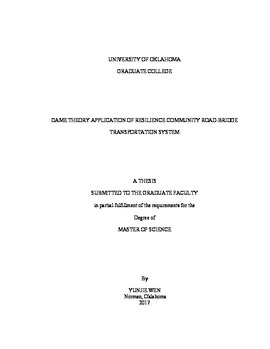Game Theory Application of Resilience Community Road-Bridge Transportation System
| dc.contributor.advisor | Nicholson, Charles | |
| dc.contributor.author | Wen, Yunjie | |
| dc.date.accessioned | 2017-12-12T19:35:22Z | |
| dc.date.available | 2017-12-12T19:35:22Z | |
| dc.date.issued | 2017-12-15 | |
| dc.identifier.uri | https://hdl.handle.net/11244/52761 | |
| dc.description.abstract | This thesis considers the problem of game theory application in resilience-based road-bridge transportation network. Bridges in a community may be owned and maintained by separated entities. These owners may have different and even competing objectives for the recovering the transportation system after disaster. In this work, we assume that each player attempts to minimize the repair time of damaged bridges after hazards happen. The problem is modeled as an N-player nonzero-sum game. Strategic form and sequential form game are designed to demonstrate methodology. A genetic algorithm is applied to the computation of the problem. A dataset with hypothetical road-bridge network with 46 nodes and 26 bridges subjected to a scenario seismic event is used to illustrate the proposed methodology. | en_US |
| dc.language | en_US | en_US |
| dc.subject | Game theory | en_US |
| dc.subject | Resilience | en_US |
| dc.subject | Transportation System | en_US |
| dc.title | Game Theory Application of Resilience Community Road-Bridge Transportation System | en_US |
| dc.contributor.committeeMember | Barker, Kash | |
| dc.contributor.committeeMember | Mohebbi, Shima | |
| dc.date.manuscript | 2017-12-08 | |
| dc.thesis.degree | Master of Science | en_US |
| ou.group | College of Engineering | en_US |
Files in this item
This item appears in the following Collection(s)
-
OU - Theses [2188]
